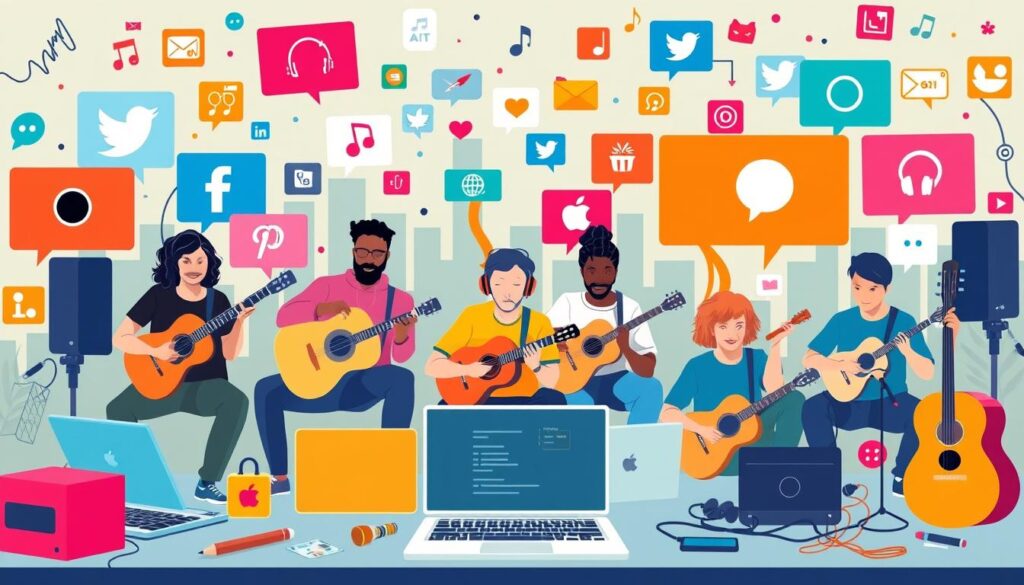In the dynamic world of music, independent artists are presented with both challenges and opportunities unlike ever before. With a whopping 2 million artists opting for distribution via DistroKid, the landscape has become increasingly competitive. However, amid this competition, a well-crafted strategy on how to get your music heard can turn the tide in your favor. The foundation of any successful artist’s career is a commitment to creating high-quality music. Once you have that crucial element in place, the next step is to engage in effective marketing music as an independent artist.
This article will unpack integrated strategies that you can use to promote your music, emphasizing the importance of a professional online presence, identifying your target audience, and the significance of leveraging social media. With tools like TikTok becoming a game changer for independent artists wanting to transition to full-time careers, the potential for reaching wider audiences has never been greater. In every aspect of your journey, remember the power of engagement, whether it be through social media interactions or live performances, to cultivate a loyal fanbase.
Let’s dive deeper into the marketing tips that will empower you on your quest for recognition and success in the music industry.
Understanding the Importance of Music Marketing for Independent Artists
Music marketing is vital for independent artists striving to make a mark in the evolving music landscape. As the industry transforms, understanding the need for effective marketing strategies becomes crucial. The goal of music marketing for independent artists revolves around identifying and engaging your target audience, ensuring they discover your music through the most appropriate channels.
To successfully promote music independently, it is essential to plan marketing campaigns meticulously. Structuring efforts into pre-launch, launch, and post-launch stages maximizes impact and creates opportunities for connection with potential fans. Leveraging social media platforms such as Instagram, TikTok, and YouTube encourages engagement through dynamic content and visual storytelling. This approach nurtures a community around your music and enhances visibility.
Email marketing plays a vital role in maintaining communication with your audience. A well-curated mailing list allows you to share updates, promote releases, and directly connect with fans. Building this connection is paramount for sustainable success, and it aligns with various music industry tips aimed at fostering loyalty within your listener base. Regular analysis of email metrics, such as open and click-through rates, provides insight into the effectiveness of these campaigns, enabling you to refine your approach.
Collaborating with influencers and fellow musicians can significantly expand your reach and boost your credibility. Research indicates that partnerships lead to increased visibility, as artists who collaborate often experience substantial growth in audience engagement. Additionally, data-driven marketing strategies utilizing analytic tools can inform decisions and optimize your music marketing efforts for better results. Tracking social media metrics, such as follower growth and engagement rates, offers valuable insights for future campaigns.
In essence, the landscape of music marketing continuously evolves. By implementing sound strategies and utilizing available tools, independent artists can effectively promote their music and carve out a lasting presence in the industry.
Build a Professional Online Presence
Establishing a professional online presence is crucial for independent artists looking to navigate the competitive landscape of the music industry. This presence allows you to connect with fans, promote your work effectively, and utilize various music marketing tools to help build a fanbase.
Create a User-Friendly Website
Your website serves as a central hub for everything related to your music. It should offer a streamlined, mobile-friendly design where fans can easily access information about you, listen to your tracks, view upcoming events, and purchase merchandise. Consider embedding music players and providing links to your social media profiles to enhance user experience.
Optimize Your Social Media Profiles
Social media platforms are essential for engaging directly with your audience. Ensure your profiles are complete and visually appealing, maintaining consistent branding across all channels. Tailor your content to each platform’s strengths; for example, utilize Instagram’s visually driven layout for stunning images and Spotify’s presence for promoting your tracks actively.
Utilize an Email Newsletter for Direct Communication
Building an email list facilitates direct engagement with your most devoted fans. Offering exclusive content or incentives for signing up can significantly enhance your outreach efforts. Use your newsletter to keep fans informed about new releases, upcoming shows, and merchandise sales while utilizing online music promotion strategies to maximize your impact.

How to Get Your Music Heard?
In today’s saturated music industry, where approximately 100,000 songs are uploaded daily, understanding how to get music heard becomes essential for independent artists. By strategically approaching your promotional efforts, you can effectively reach your target audience and elevate your music career.
Identify Your Target Audience
To effectively promote your music online, start by identifying who listens to your music. Understanding their demographics and preferences enhances your music promotion strategies, allowing you to tailor your approach. Focus on where they typically discover new music—be it on social media platforms, streaming services, or music blogs. This targeted approach boosts engagement and expands your reach.
Choose the Right Distribution Service
Using a reliable distribution service is crucial for getting your music on major platforms like Spotify and Apple Music. Services such as DistroKid and CD Baby not only distribute your tracks but also offer tools that aid in marketing and playlist placement. Choosing the right distribution service helps you maximize exposure and access a wider audience while promoting your music online effectively.
Get Your Music on Popular Playlists
Featured placement on playlists can drastically increase your visibility. Submitting your tracks to curated playlists via platforms like SubmitHub or directly connecting with playlist curators can yield significant results. Getting your music on popular playlists provides an avenue for reaching new listeners and enhances your chances for royalty earnings, making it a vital component of successful music promotion strategies.

Effective Music Promotion Strategies
For independent artists, effective music promotion strategies are crucial for achieving success. Utilizing a variety of platforms can create significant opportunities for exposure and relationship-building with fans. Emphasis on creativity and authenticity will grab attention in a crowded market.
Leveraging Social Media Platforms
Social media for musicians offers a massive audience, with over 3.96 billion users globally. Regular engagement through posts, comments, and trending topics builds a loyal fan base. Research shows that artists active on these platforms can boost fan engagement by 15-20%, leading to increased music sales. Consider focusing on one or two platforms initially to maximize your efforts, ensuring consistent content that resonates with your audience.
Engaging Content Creation
Creating engaging content plays a vital role in visibility. This could include music videos, behind-the-scenes footage, or collaborative projects that connect deeply with your listeners. Artists with an active website and EPK notice a 60% increase in inquiries compared to those relying solely on social media. Integrating powerful visuals and personal stories can create a deeper emotional connection, enhancing your music’s appeal.
Utilizing Live Performances
Live performances serve as a powerful tool for independent artist success. These events foster real connections with fans and can lead to a 25-30% rise in merchandise sales at shows. Think about starting with local venues to build a community and gradually expanding. Including musical clips and images from performances on your social media will notably increase engagement and help promote upcoming shows.
The Role of Collaborations and Networking
Collaborations and networking play a crucial role in the journey of independent artists. These strategies not only enhance visibility but also create opportunities that can significantly impact your music career. Engaging with other musicians and influencers can open doors to new audiences while establishing valuable connections that facilitate growth.
Partnering with Other Artists and Influencers
Working with fellow musicians or influencers can amplify your reach and introduce your music to diverse fan bases. Consider forming partnerships that complement your musical style. Engaging with artists who share your vision can lead to fruitful collaborations that elevate both parties. Remember, effective self-promotion for musicians hinges on these strategic alliances. The music industry thrives on connections, with networking being responsible for approximately 85% of success. Forming alliances today could position you favorably for tomorrow’s opportunities in growing an independent music career.
Engaging with Music Bloggers and Press
Building relationships with music bloggers and media personnel can dramatically enhance your visibility. Securing coverage on popular platforms offers an incredible advantage as you work towards raising awareness for your music. An electronic press kit (EPK) can be a powerful tool, making it easier for these outlets to share your story. Personalized communication significantly improves your chances of securing media placements. Engaging effectively with the press is crucial for independent artist tips focused on sustaining and expanding your music career.
Monitoring and Adapting Your Music Marketing Efforts
To effectively promote your music, continuous monitoring of your strategies is essential. Start by leveraging various music marketing tools that provide insightful data about your performance. Platforms like Google Analytics, Facebook Insights, and Spotify for Artists offer invaluable metrics on social media engagement and streaming activity. This data helps you understand which approaches resonate with your audience and which do not.
Establish clear goals for your marketing campaigns. Track actual performance against these expectations, adjusting your methods accordingly. For example, if email marketing proves particularly effective, consider offering exclusive content or free downloads to encourage newsletter sign-ups, thereby directly engaging with fans. This method plays a pivotal role in how to build a fanbase.
Engagement on social media platforms is another critical area to monitor. Analyzing trends and audience interactions allows you to tailor your content. Platforms such as Facebook, Instagram, and Twitter provide targeted advertising options so you can reach specific demographics with paid advertising strategies. Using relevant hashtags and participating in discussions can significantly boost visibility, attracting more potential listeners.
The following table outlines various strategies to enhance your music marketing efforts based on analytics:
| Strategy | Monitoring Tools | Action Steps |
|---|---|---|
| Email Marketing | Email platform analytics | Increase newsletter incentives like exclusive downloads |
| Social Media Engagement | Facebook Insights, Instagram Analytics | Post consistently and interact with followers |
| Streaming Data Analysis | Spotify for Artists, Apple Music analytics | Identify listener preferences and adjust content |
| Targeted Advertising | Ad platform insights | Refine audience targeting based on performance |
| Content Engagement | Google Analytics | Analyze website traffic and adapt content strategy |
Regularly assessing your music marketing efforts will allow you to capitalize on emerging opportunities and better understand market conditions. Implementing these strategies effectively supports your journey in achieving greater reach and success in the industry.
Conclusion
Successfully navigating the music industry as an independent artist involves a blend of creativity and strategic planning. To truly thrive in today’s competitive landscape, remember that prioritizing the quality of your music is essential. Invest in crafting a compelling artist image, engaging biography, and consistently high-quality promotional material, as these are fundamental components that contribute to how to get your music heard.
Utilize social media platforms and streaming services like Spotify and Apple Music to create a buzz around your music. Engaging your audience through interactive content and regular updates fosters a loyal fanbase. Additionally, networking both online and offline will open doors to valuable opportunities, allowing you to collaborate with other artists and industry professionals alike, ultimately aiding your growth and visibility in the music scene.
By incorporating these music industry tips into your marketing strategy, you can adapt and refine your approach based on audience feedback and performance metrics. This adaptability not only enhances your promotional efforts but also sets you on a path to significant exposure and success, making an impact in the ever-evolving music landscape.
- Top 10 Rap Albums That Changed the Game Forever - December 19, 2024
- The Impact of Music Streaming on Artist Revenue - December 19, 2024
- Comparing Digital Music Formats – MP3 vs FLAC vs WAV - December 18, 2024


